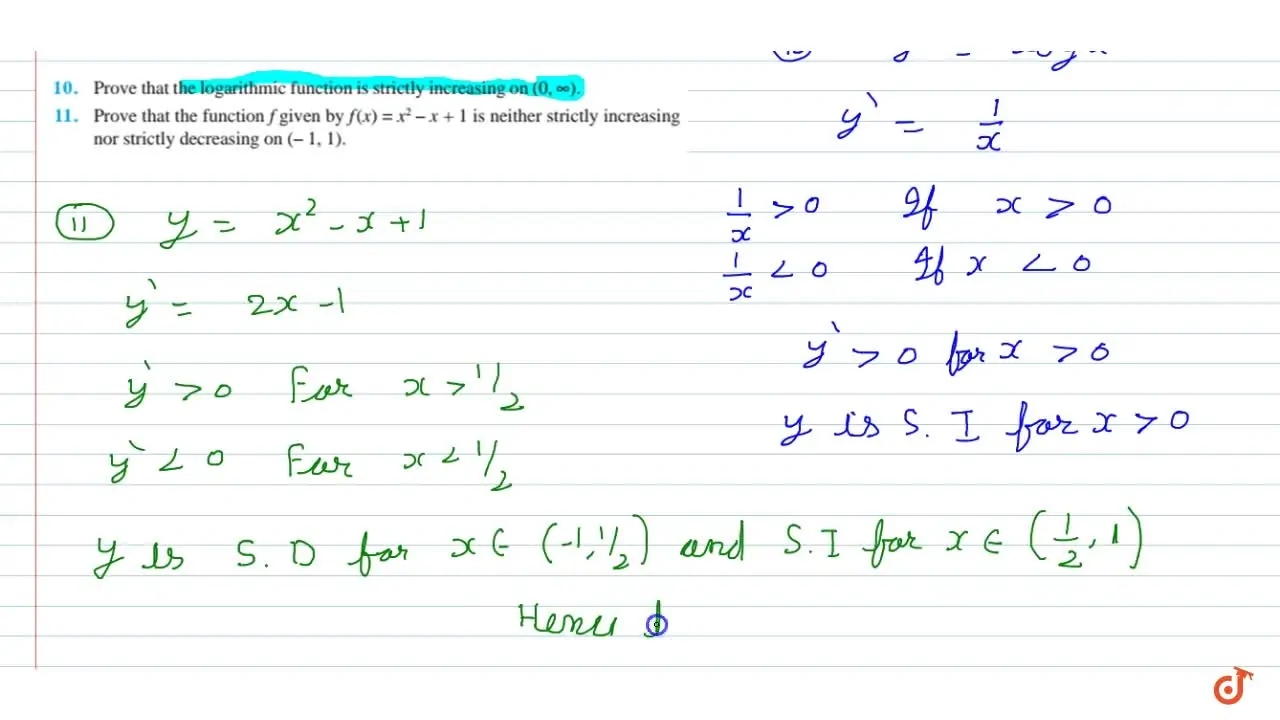Prove that the function f given by f(x)=x2−x+1is neither strictly increasing nor strictly decreasing on (1,1).
The given function is f(x)=x2−x+1
f'(x)=2x−1
Now f'(x)=0
⇒x=12
The point 12 divides the interval (1,1) into two disjoint intervals i.e., (−1,12)and(12,1)
Now, in interval (−1,12),f'(x)=2x−1<0
Therefore, f is strictly decreasing in interval (−1,12)
However, in interval (12,1),f'(x)>0⇒f is increasing
Hence, f is neither strictly increasing nor decreasing in interval (−1,1).
Related Playlists
- BOOK - NCERTCHAPTER - APPLICATION OF DERIVATIVESEXERCISE - EXERCISE 6.118videos
APPLICATION OF DERIVATIVES
- BOOK - NCERTCHAPTER - APPLICATION OF DERIVATIVESEXERCISE - EXERCISE 6.529videos
APPLICATION OF DERIVATIVES
- BOOK - NCERTCHAPTER - APPLICATION OF INTEGRALSEXERCISE - EXERCISE 8.27videos
APPLICATION OF INTEGRALS
Similar Questions
Show that the function f(x)=x2 is neither strictly increasing nor strictly decreasing on R.
View SolutionShow that the function f(x)=x2 is neither strictly increasing nor strictly decreasing on R .
View SolutionProve that the function given by f(x)=2x3−6x2+7x is strictly increasing in R.
View SolutionProve that the function f given by f(x)=logcosx is strictly increasing on (−π/2, 0) and strictly decreasing on (0, π/2) .
View SolutionProve that the function f given by f(x)=log(cosx) is strictly increasing on (−π2,0)and strictly decreasing on(0,π2)
View SolutionFind the intervals in which the function f given by f(x)=x2−4x+6 is (a) strictly increasing (b) strictly decreasing
View SolutionProve that the function 'f' given by f(x)=logsinx is strictly increasing on (0,π2) .
View SolutionProve that the function f given by f(x)=logcosx is strictly decreasing on (0,π2) .
View SolutionProve that the function defined by f(x)=ex is strictly increasing in R
View SolutionFind the intervals in which the function f given by f(x)=sinx−cosx,0<x<2π is strictly increasing or strictly decreasing.
View Solution


